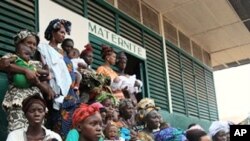Health workers in Guinea say free, government-subsidized cesareans can work in the fight against maternal deaths if women can reach the operating table in time. One rural community has devised some clever ways to improve women's health.
In the maternity ward of Kissidougou's regional hospital in southeastern Guinea, 20-year-old Mariam Balde held her twin babies, a boy and a girl, born eight days ago via a cesarean operation paid for by Guinea's government.
She says she had to have an operation because the babies were in the wrong position and they could have died. She says she did not know what a cesarean was or that she needed one, but that she is grateful. She says she now encourages all women to get their prenatal checkups and to come to the hospital immediately if they are having trouble.
One woman in Guinea dies for every 100 live births, and women in rural areas are at particularly high risk.
Guinea's government offers free cesareans, but health workers say the initiative does not do much good if families do not have the money or the means to get women to hospitals.
Roads in rural areas may be impassable during the rainy season, vehicles may be scarce, and impoverished families may be stuck haggling with drivers over exorbitant fees, while a woman or her baby dies.
But rural communities in the Kissidougou region of southeastern Guinea have found a creative solution that is saving lives.
They are called motorcycle ambulances, three-wheeled motorbikes outfitted with small trailers that can carry one health worker and a reclining patient.
Twelve motorcycle ambulances are parked in front of rural health centers around the region ready, day or night, to pick up pregnant women from villages and bring them to health centers or if necessary take them on to the regional hospital. And the ride is free.
Mory Sano, chief medical officer at the rural health center in Fermissedou, says their motorcycle ambulance has had a profound impact. We can now reach pregnant women in even the farthest villages, he says. If we cannot treat a woman here at the health center, he says, we immediately send her to the regional hospital, about an hour's drive away. That would not be possible, he says, without the motorcycles. Thanks to them, he says, fewer women and babies are dying.
The motorcycle ambulances are part of a local health co-operative, called MURIGA, a mutual savings society aimed at helping women address the risks of childbearing.
Emergencies during childbirth, like hemorrhage and uterine rupture, are not the only dangers expectant mothers in the region face. Anemia, malnutrition and hypertension can also endanger the life of a pregnant woman and her baby, but local officials found the cost of prenatal care was discouraging poor women from seeking treatment. Now, families in the region can pay MURIGA a yearly membership fee of $3.00 and the association will cover all the health care costs of a woman's pregnancy.
MURIGA coordinator Marie Sia Yombouno says poor families sometimes went into debt to send women to the hospital in cases of emergency. Now, once a family joins MURIGA, they do not worry about paying. She says MURIGA takes care of pregnant women all the way through labor and delivery.
Thanks to MURIGA's work, three quarters of pregnant women in Fermissedou were treated in health centers from conception to childbirth last year, up from only a third of pregnant women in 2006.
MURIGA hopes to extend its insurance offerings to all children under age five in the Kissidougou region.
The nonprofit is supported by the U.N. Children's Fund. Visiting the region this month, UNICEF country representative Julien Morcom-Harneis commended the initiative.
This work is exceptional, he says. Maternal mortality is a large problem throughout the country, but he says in this region the community has shown that it can work with the government to solve it. They have achieved extraordinary success, he says, and I hope we can find ways to replicate this system around the country.
But he said shortages of medicines and supplies still plague hospitals and health centers around the country and UNICEF hopes that next month's presidential poll will clear the way for much-needed, government-led reform to Guinea's health-care system.




